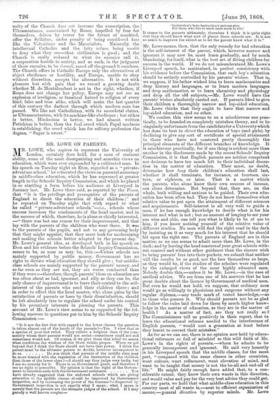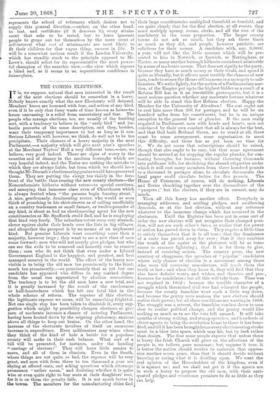MR. LO Wk. ON PARENTS.
MR. LOWE, who aspires to represent the University of London, certainly does hold, for a man of eminent ability, some of the most disorganizing and anarchic views on education, which were ever expounded by a cultivated man. In his speech on Tuesday night on Eton, regarded as a "private- adventure school," he reiterated the views on parental autocracy in middle-class education, which he has expressed at greater length to the Schools' Inquiry Commission, and which he placed in so startling a form before his audience at Liverpool in January last. Mr. Lowe there said, as reported by the Times, that "it is the privilege and prerogative of the parents of England to direct the education of their children ;" and he repeated on Tuesday night that with regard to what he called "private-adventure schools,"—i.e., schools whose success increases the emoluments of the head master, and in the success of which, therefore, he is alone or chiefly interested, —" there was but one course for their improvement, and that lay with the parents of the children who went there. It was to the parents of the pupils, and not to any governing body that they might appoint, that they must look for modernizing and making the schools better adapted to the present day." Mr. Lowe's general idea, as developed both in his speech on Eton and his evidence before the Schools' Inquiry Commission, seems to be, as near as may be, this :—Unless schools are mainly supported by public money, Government has no right to dictate what education they should give ; but middle- class schools are mainly supported by the parents' money, and so far even as they are not, they are worse conducted than if they were ;—theref ore, though parents' ideas on education are too often about as bad, ignorant, and silly as they can be, the only chance of improvement is to leave their control to the self- interest of the parents who send their children there ; and in order to effect this the head master, who alone gains by the satisfaction of parents or loses by their dissatisfaction, should be left absolutely free to regulate the school under his control by his pecuniary interests in pleasing the parents. This account of Mr. Lowe's view seems to us supported by the fol- lowing answers to questions put to him by the Schools' Inquiry Commission :— "Is it not the fact that with regard to the lower classes the question is taken almost out of the hands of the parents ?—Yes. I view that as a species of poor-law relief. They relieve a helpless class of the com- munity whom their parents would not assist—sometimes could not and sometimes would not. Of course, if we give them that relief we annex what conditions the wisdom of the State thinks proper. When we get beyond that I think the State should not have that power. I think the parent must be the ultimate person to decide, however incompetent to
do so. Do you think that parents of the middle class may be more trusted with the regulation of the instruction of the children than those of the lower class 2-1 should say they judge very badly, but I see no remedy for it. There is no Government grant, and therefore I see no right to prescribe. My opinion is that the right of the Govern-
ment to interfere ends with the Government assistance. You have already suggested that the endowed schools which are giving education to the middle classes should be improved by Government inspection, and by increasing the power of the trustees ?—Improved by Government inspection is not exactly what I mean ; what I mean is merely that the parents are the ultimate judges of the school. If I may parody a well known couplet—
'Instruction's laws instruction's patrons give, For those who live to teach must teach to live,' It comes to the parents ultimately, therefore I think it is quite right ' that they should know what sort of places these schools are. It is not. so much to improve the school as to let the parent know what it is."
Mr. Lowe means, then, that the only remedy for bad education is the self-interest of the parent, which, however narrow and ignorant it may now be, must learn gradually, and by much blundering, for itself, what is the best art of fitting children for success in the world. If we do not misunderstand Mr. Lowe's Liverpool speech, he maintained, in perfect consistency with his evidence before the Commission, that each boy's education should be entirely controlled by his parents' wishes. That is,. we suppose, if his father wished him to learn mathematics and drop history and languages, or to learn modern languages. and drop mathematics, or to learn chemistry and physiology and drop all the old subjects,—Mr. Lowe would have the- parents' wishes absolutely carried out. If parents liked to give their children a thoroughly narrow and lop-sided education, Mr. Lowe thinks that they ought to have that narrow and lop-sided education, and no other.
We confess this view seems to us a mischievous one prac- tically, to be founded on completely mistaken theory, and to be singularly unfortunate from the candidate for a Universitywhich has done its best to direct the education of boys (and girls), by- declining to give any sort of certificate of special attainment to those who have not mastered pretty thoroughly the-
principal elements of the different branches of knowledge. It is mischievous practically, for if one thing is evident more than
another in the disclosures made by the recent Schools' Inquiry Commission, it is that English parents are neither competent nor desirous to have too much left to their individual discre- tion in the matter of education. They must, no doubt,. determine how long their children's education shall last, whether it shall terminate, for instance, at fourteen, six--
teen, or eighteen, or later. That is a matter which the parents, who alone know their own sources of income,
can alone determine. But beyond that, they are, on the whole, both willing and anxious to be guided. Their own edu- cation has been often bad. They do not know themselves what relative value to put upon the attainment of different sciences- and acquirements. Self-interest is all very well to guide a. man, if he has enough knowledge to decide what is for his interest and what is not ; but no amount of longing to see your- son wise and able, can tell you. what is likely to be of use to-
him, if you know nothing yourself of the relative value of different studies. No man will find the right road in the dark by insisting on it as very much for his interest that he should hit upon the right one. The parents of England are in this matter, as no one seems to admit more than Mr. Lowe, in the dark ; and by leaving the head masters of your great schools with- out counsel and without other guidance than the sincere wish to bring parents' fees into their pockets, we submit that neither will the results be so good, nor the fees themselves so large, as they would be, if the studies of the scholars were regulated by the enlarged views of the most highly educated men. Nobody doubts this,—unless it be Mr. Lowe,—in the case of - medical advice. We see from one of his answers that he has- great doubts about the licence by Government of medical men. But even he would not hold, we suppose, that ordinary men.
would go as willingly to physicians and surgeons without any regular diploma,—any trade mark of tested knowledge,—as. to those who possess it. Why should parents not be as glad to follow the rules laid down for them by much higher know- ledge in the matter of education, as they are in the matter of health I As a matter of fact, are they not really so ?- The Commissioners tell us positively in their report, that to leave the educational reforms needed to the interference of English parents, "would cost a generation at least before- they learnt to correct their mistakes."
As far as we can see, there is no opinion now held by educa- tional reformers BO full of mischief as this wild faith of Mr.
Lowe's in the rights of parents,—whom he admits to be incompetent and ignorant. He said very honestly- in his Liverpool speech that the middle classes, for the most. part, "compared with the same classes in other countries, want culture, want refinement, want elevation of mind, and want to be taught that money is not the be-all and end-all of life." He might fairly enough have added that, to a con- siderable extent, they know their own wants in this direction,. and would value and pay for the very best advice they could get.
For our parts, we hold that what middle-class education in this country most of all wants is,—next to efficient organization of means,—general direction by superior minds. Mr. Lowe represents the school of reformers which desires not to supply this general direction,—rather, on the other hand, to test, and certificate (if it deserves it). every attain- ment that asks to be tested, but to leave ignorant people to grope out for themselves by the mere scent of self-interest what sort of attainments are most likely to fit their children for that vague thing, success in life. It will be a somewhat curious result if the London University, which has steadily stuck to the principle opposed to Mr. Lowe's, should select for its representative the most power- ful champion of the anarchic view,—the view which reposes a blind and, as it seems to us, superstitious confidence in laisser-faire.



































 Previous page
Previous page